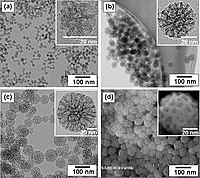
Photo from wikipedia
Globally, the production of polystyrene (PS) increases due to its vast applications in many sectors. PS is a form of polymer which is hazardous and non-biodegradable leading towards major problems,… Click to show full abstract
Globally, the production of polystyrene (PS) increases due to its vast applications in many sectors. PS is a form of polymer which is hazardous and non-biodegradable leading towards major problems, such as environmental, landfills, etc. To reduce the waste of PS, it is utilized to modify the bitumen used for the road construction which provides better enhancement in durability of pavements. Modification of bitumen incorporating polystyrene waste through dry and wet process gives a way to reuse it in a huge quantity and an approach to action for waste disposal and its treatment against land filling. The current demand is to reduce or recycle the PS waste through dry process or wet process in road construction for the better development in future. The aim of the current work is to use the PS waste in conventional bitumen with different proportions by weight of bitumen. To achieve this objective, the conventional bitumen and PS modified bitumen along with various percentage of PS waste were developed and characterized through physical properties like penetration, softening point and viscosity tests, rheological properties using dynamic shear rheometer (DSR). The mixing property of the PS modified bitumen was evaluated by Marshall Stability test. The structure of binders was studied through Fourier transform infrared spectroscopy (FT-IR) and field emission scanning electron microscopy (FE-SEM). The laboratory results indicated that the PS modified bitumen satisfied the requirements of codal provisions and showed significant improvement as compared to conventional binder.
Journal Title: International journal of pavement research and technology
Year Published: 2021
Link to full text (if available)
Share on Social Media: Sign Up to like & get
recommendations!